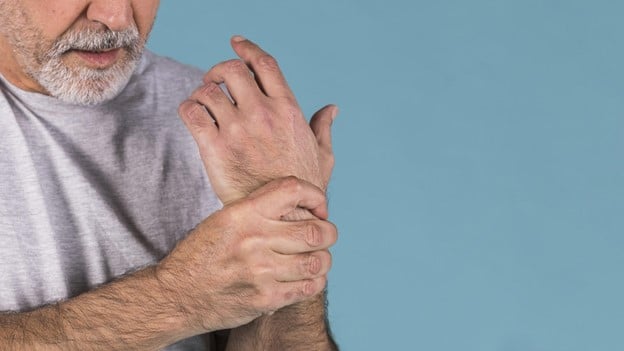Carpal Tunnel Surgery in Auckland New Zealand
Carpal tunnel syndrome is a common condition that usually causes pain and numbness in the hands. The condition happens when one of the nerves supplying your hand becomes compressed by surrounding tissue. A number of factors can lead to carpal tunnel syndrome, such as your own anatomy, gender, and the nature of your work. Both surgical and non-surgical treatment options are available and have proven effective in treating the condition successfully. When non-surgical treatment is ineffective then Carpal Tunnel Surgery can help.
Dr Mark Gittos is an experienced Plastic Surgeon and hand surgeon in Auckland NZ and performs surgery to relieve Carpal Tunnel Syndrome.
What causes carpal tunnel syndrome?
The median nerve is a large nerve that transmits sensation from the palmar side of all your fingers (except the little finger) and allows your thumb to move. This nerve extends from your forearm to your fingers and passes through a narrow “tunnel” at your wrist. This tunnel is called “the carpal tunnel”.
When the tunnel becomes narrow for any reason, it squeezes the median nerve, causing the multitude of symptoms that define carpal tunnel syndrome. Conditions like rheumatoid arthritis or wrist bone fractures can cause inflammation and narrowing of the carpal tunnel, subsequently compressing the median nerve and irritating it.
Most of the time, multiple causes lead to narrowing of the carpal tunnel, and no single factor is found to be solely responsible.

What are the symptoms of Carpal Tunnel Syndrome?
Carpal tunnel syndrome involves the palmar side of your hand and fingers, except the little finger. The symptoms usually start gradually and become worse with time:
- Parasthesias: This is the medical term for numbness and tingling. They’re usually worse at night and when you do activities that require flexing your hand, like holding a steering wheel or a phone. Parasthesias are also more pronounced at night time.
- Hand weakness: The muscles of your hand can become weak, so you might occasionally drop objects or have trouble maintaining a good grip.
Who is most likely to develop Carpal Tunnel Syndrome?
Researchers (see below) have identified several factors that might put you at risk of developing carpal tunnel syndrome:
- Anatomy: The anatomy of the carpal canal can be affected by multiple conditions, like wrist fractures or rheumatoid arthritis, which cause the tunnel to become narrow. This squeezes the median nerve and causes all your symptoms. Some people are born with an already narrow carpal tunnel and have a lower threshold of developing the syndrome.
- Gender: Women are statistically more likely to develop carpal tunnel syndrome. The reason might be that women have smaller carpal tunnels, and are hence more susceptible to median nerve compression.
- Diabetes: One of the complications of uncontrolled Diabetes Mellitus is nerve damage. This includes the median nerve as well.
- Inflammatory conditions: Conditions like rheumatoid arthritis can cause the tissue that forms the carpal canal to thicken and press on your median nerve.
- Certain medications: according to research, the breast cancer drug “anastrozole” is linked to carpal tunnel syndrome.
- Obesity: Being obese puts you at a higher risk of developing carpal tunnel syndrome.
- Fluid retention: Conditions that cause your body to retain fluids, such as pregnancy and menopause, may put more pressure on your carpal tunnel.
- Certain medical conditions: Conditions like thyroid problems, menopause, and kidney problems are all associated with carpal tunnel syndrome.
- Type of job: Evidence is still not very convincing, however, some scientists believe that working jobs that include frequent wrist flexing may contribute to carpal tunnel syndrome. These jobs include working on an assembly line or using a computer mouse.
How is Carpal Tunnel Syndrome diagnosed?
- Medical history and physical examination: Dr. Gittos will start by performing a thorough physical examination and asking some questions to establish a clear medical history. Numbness and tingling in your palm that spares the little finger are usually highly indicative of carpal tunnel syndrome. The pain typically occurs when you are holding your phone or the steering wheel, and is more frequent during night time.
- X-ray: X-rays do not actually show a narrow carpal tunnel, however, your doctor might order these to make sure there’s nothing else involved in causing your symptoms
- Electromyography: This is a test that measures electrical impulses in your muscles to know if they are functioning well. The test involves inserting tiny needles into the muscles for measurement. Electromyography can give your doctor an idea about the nature of your disorder.
- Nerve conduction study: This test measures how fast your nerves are conducting electrical current to see if they’re functioning normally. If you have carpal tunnel syndrome, the impulses will take more time to conduct.
How is Carpal Tunnel Syndrome treated?
Both non-surgical and surgical treatment options are available for treating carpal tunnel syndrome:
Non-surgical treatment options
- Splinting: We might recommend that you wear a wrist splint at night. This will prevent both night and day symptoms.
- Oral medications: Nonsteroidal anti-inflammatory drugs (NSAIDs) like ibuprofen and aspirin are sometimes prescribed to relieve pain and reduce inflammation
- Injectable corticosteroids: Your doctor may suggest injecting steroids into your carpal tunnel to reduce inflammation and allow your median nerve to pass more freely.
Carpal Tunnel Surgery treatment options
Surgical treatment is usually reserved for patients who fail medical treatment or have severe symptoms. The surgery aims to alleviate the symptoms associated with carpal tunnel syndrome by cutting the ligament that surrounds the carpal tunnel, allowing the median nerve more room to pass without compression. Two main surgical techniques are available:
- Endoscopic surgery: In this type of surgery, your surgeon uses a cord-like device with a camera on its tip (called an endoscope) to enter the carpal tunnel and release the median nerve. The procedure is performed through one or two small incisions, without any large wounds.
- Traditional surgery: Dr. Gittos will perform an incision over your wrist to enter the carpal tunnel, cut the surrounding ligament, and make more room for the median nerve to pass.
Carpal Tunnel Surgery Procedure – What to expect?
For the few days following surgery, you might feel some pain at the site of the procedure, along with swelling and bruising. These should go away fairly quickly without any special care.
The wound on your skin will heal in a few weeks, while the ligament surrounding the carpal tunnel might take a little more time. Dr. Gittos might recommend that you avoid using your hand until the ligament has fully healed. This is usually a gradual process, starting from simple light movements until reaching normal movements in a few months. Some patients might have wrist pain and weakness that persists for a few weeks or months after surgery. This usually resolves spontaneously as the ligament and tissue heal.
Dr Gittos leading Auckland Plastic Surgeon has significant experience in treating carpal tunnel syndrome surgically.
Call us any time to set up an appointment and get a full assessment to see which treatment option is best for you.
Complications and Risks of Hand Surgery
Hand surgery incurs risks and complications like all invasive surgery. Dr Gittos will make you aware of potential complications during your consultation. This includes general anaesthesia risks, bleeding (Hematoma), infection, wound healing, deep vein thrombosis, scarring and numbness. Always stay informed and healthy, do NOT smoke before or after your procedure and read & understand your risks of surgery.
Further Reading – Medical Sources:
- DOWNLOAD a Useful Fact sheet on CTS
- American Academy of Orthopaedic Surgeons on Carpal Tunnel Syndrome
- UpToDate on Carpal tunnel syndrome: Treatment and prognosis
- Johns Hopkins Medicing on Conditions We Treat: Carpal Tunnel Syndrome
How to find a Hand Surgeon in Auckland, NZ
Always choose a top specialist plastic surgeon or hand surgery expert for your hand surgery. As a general rule, it is better to avoid the cheap option when seeking surgery. Look at your surgeon’s online reviews to find out how they look after their patients and what their patient says about them.
Why Choose Dr Mark Gittos?
Dr. Mark Gittos in Auckland, New Zealand is a renowned plastic surgeon who’s experienced in treating hand injuries and disorders, such as nerve compression disorders, ligament or tendon injuries, among others. If you’d like to learn more about your condition, call us to set an appointment with Dr. Mark to get a full assessment and discuss treatment options.
Making an Appointment for a Hand Consultation with Dr Gittos
If you have any symptoms that might be related to a hand tendon injury, please call to make an appointment with Dr. Mark Gittos in Auckland, New Zealand. Dr. Mark is a plastic surgeon who is experienced in treating a wide range of hand disorders, such as trigger finger, De Quervain’s syndrome, cubital and radial tunnel syndromes, carpal tunnel syndrome, ligament disorders, and tumours or ganglions. Come visit us to get a full assessment of your condition and learn more about your treatment options.
About Dr Mark Gittos FRACS (Plast) – New Zealand Plastic Surgeon
Practice locations in Herne Bay Auckland, Northland and Bay of Plenty – Kerikeri, Whangarei, New Plymouth & Tauranga
Dr Mark Gittos is a leading Specialist Plastic Surgeon and operates a practice in Herne Bay, Auckland and in the UK. The practice focuses on both surgical and non-surgical procedures, each designed to help restore, improve or change a physical characteristic or problem. The first step in every case is to talk through your personal requirements and explore all the options, before deciding on the most effective solution.
Dr Mark Gittos offers high quality, natural-looking cosmetic surgery results and is highly experienced in Breast, Body and Face Surgery having performed over 4000 Surgeries in the last 26 years. With worldwide expertise Dr Gittos is an expert in breast, face and body surgery for men & women.
Naturally, before any treatment is begun, we will explain clearly the advantages and risk factors; so that you have the information you need to make an informed decision that is best for you. Visit the practice to find out more.

NEXT STEPS
Please NOTE: Dr Gittos only performs surgery on non-smoker patients with a BMI less than 30. To check your BMI please visit the NZ Heart Foundation website. For help giving up smoking before surgery visit the Smoke Free website
Do your Research
- Read the Website and Blogs relevant to your procedure
- Browse our Frequently Asked Questions including how to choose a Surgeon for your procedure
- Download and read the FREE Guides to Surgery
What to Bring to your Plastic Surgeon Consultation
- Bring a friend or relative to help discuss the information and your choices
- Take lots of notes and read the documents provided thoroughly
- Dress in simple clothes as you may need to undress for examination
- Bring your medical referral and any relevant medical documents or test results
Book your Initial Surgery Consultation
- A Referral from your GP or specialist is helpful but NOT essential – you can have a consultation without a GP Referral
- Email us or Call on 09 529 5352 to arrange your surgeon consultation appointment.
- Book a consultation with Dr Gittos by paying the Consultation Fee – $350 incl GST
Traveling for Surgery? – Consider post-surgery luxury recovery in a Hotel with LuxeCare
Please contact us to arrange to book a consultation with our Specialist Plastic Surgeon or to speak with our Patient Care Advisor.
Send an enquiry form today or phone 09 529 5352 during Clinic Hours
